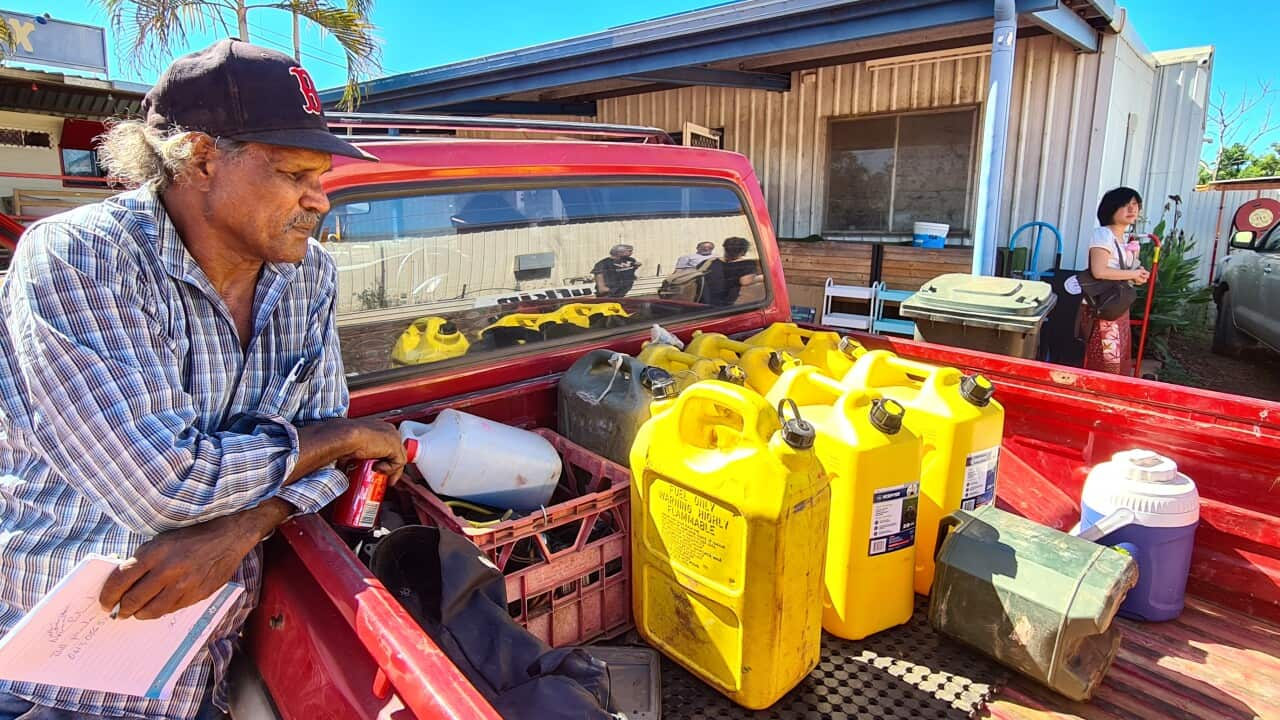Key Points
- Indigenous climate activists have protested at COP27.
- First Nations people in Australia say they aren't consulted on fossil fuel mining projects on their land.
- They say this is a mistake Australia can't make in the renewables transition.
Traditional Owners and Aboriginal sustainability experts have warned the Australian government against making the same "mistake" it did with fossil fuel mining, and to properly consult First Nations leaders before developing renewable energy projects on their land.
It came as Indigenous activists from across the planet called on governments to respect First Nations' land rights during .
Experts say coal and gas projects, which have received bipartisan support from Australian governments, have gone ahead on Aboriginal land without their approval and without equal sharing of benefits.
With the and an influx of investment into renewable projects, Dr Heidi Norman, convener of the Indigenous Land and Justice Research Hub, told SBS News that now is the "best opportunity for Australia to rethink its relationship with Aboriginal people".
'Green capitalism' operators must consult with Traditional Owners
Dr Norman, a descendant of the Gomeroi people from northwestern NSW, said the Australian government and contractors can consult Indigenous people through initiatives like the .
"It's made up of First Nations peoples, groups, community organisations, their land councils, unions, and academics, who have technical expertise," she said.
"And what the network wants to do is advocate to provide skills for the community and advocate with clean energy operators to ensure that this new moment of this new economy is better than the last — the old economy — and that original landholders are the beneficiaries.
"We want them to be in the driving seat for these sorts of projects.
"Don't make the same mistake."
Dr Norman said "old economy" refers to the development of fossil fuel mining on Aboriginal land, where a lack of consultation, consent, or benefit sharing has taken place.
"Aboriginal landholders under Native Title, do not have the right to veto when a mining operator seeks to undertake extraction on land where you have rights and interests — all you can do is negotiate," she said.
"And the terms of that negotiation are very limited."
Dr Norman said there's hope for greater rights in the renewables transition.
"It's hopeful that renewable energy is under a different generation of operators," she said.
"There is a greater sense that the energy transition comes also with a changed political landscape.
"It comes with a consideration of the environment and consumption patterns. So we hope Indigenous rights will be part of this new economy."
What happened with fossil fuel mining?
Johnny Wilson, chair of Nurrdalinji Aboriginal Corporation, said fracking in the Northern Territory's Beetaloo Basin was destroying Aboriginal land and proceeded without their consultation.
"I can feel the heat, smell the gas, and the country has just gone brown," he said.
"It's not the same anymore."
The Gudanji, Yanyuwa, Garrwa, Jingili, Mudburra, and Alawa nations have been fighting against fracking expansion since the Morrison government announcement in 2021.
Mr Wilson said Traditional Owners were "lied to" and not properly consulted about the extent of fracking. Despite their protest, projects have gone ahead, receiving subsidies from both the former Coalition and current Labor governments.
"Back then, my people were told that the holes would be the size of billy cans and they would only make one or two, and that was it. Little did they know, the top paper they were signing — the exploration paper — was the hook line and sinker for all the way to production stage," he said.
"We're very shocked and heartbroken to see these gas flows coming out of the ground."
Fracking is the process of injecting liquid at high pressure into subterranean rocks or boreholes to force open existing fissures and extract oil or gas.
Mr Wilson said there's no difference between the water fracking companies are taking from Aboriginal land without their permission and "stealing".
"We can't just walk into a shop, grab a bottle of water and walk out. We get fined for that. That's stealing. What is the difference with them taking all our water and using as much as they can so they can do their hydraulic fracking?" he said.
Accusations of a lack of consultation with First Nations people at the Beetaloo Basin is one of the other incidents reported around Australia, including a $5 billion Santos gas project near the Tiwi Islands, and a $12 billion Woodside project in Western Australia destroying Indigenous artwork.
Renewable 'mega projects' on Aboriginal land
Jon Altman, a director of and a policy adviser to the First Nations Clean Energy Network, said there are several "mega" renewable projects on Aboriginal land that need to consult with and share benefits with Traditional Owners.
"I want to ask whether mega renewable projects, a key element of Australia’s clean energy transition, have potential to be an elixir, or at least help to reduce remote Indigenous disadvantage?" he said.
"It is inevitable that many such projects will be located on Indigenous-titled lands; indeed, there are already three mega projects proposals: Sun Cable, the AREH, and the Western Green Energy Hub on Indigenous lands in the NT and WA with purported development costs of $30 billion, $50 billion and $100 billion respectively."

Source: Jon Altman—supplied.
Mr Altman said decarbonisation, to achieve net zero emissions by 2050, needs "decolonisation".
"Decolonisation expressed through self-determination will be at the heart of the national decarbonisation project that will need to embrace notions of diverse development from an Indigenous bottom up, rather than state and corporate top-down, perspectives," he said.
A pattern across the world
During , Indigenous rights groups from around the world — India, Canada, Australia, the Amazon, the Philippines, and other regions —have been banding together to stand up for their land rights.
Joan Carling, executive director of Indigenous Peoples Rights International, and an Indigenous Filipino woman, said Indigenous people are being neglected in "green colonialism".
"The ambitions push for decarbonisation without social equity and protection of human rights is another wave of green colonialism against Indigenous peoples in their name of climate change actions," she said.

Filipino climate activist and Indigenous woman Joan Carling. Credit: Flickr
Ms Carling said Indigenous people "remain invisible in decision-making processes relating to the so-called zero net emission or decarbonisation".
Licypriya Kangujam, an 11-year-old Indigenous Indian climate activist, said sacred forests are developed without the permission of Indigenous peoples.
"The forests belonging to the Indigenous tribal Adivasi people like Hasdeo forest in Chhattisgarh are sold out by our leaders to big companies like Adani for coal mining," she said.

Licypriya Kangujam, a then 9-year-old girl, stages a protest in the Vijay Chowk area over air pollution in New Delhi, India. Credit: Hindustan Times/Hindustan Times via Getty Images
She said thousands of Indigenous peoples are being displaced.
"Just to build a statue in Gujarat state of India along the Narmada River, more than 75,000 indigenous tribal people from 72 villages had been displaced, submerged their fertile lands in water, destroyed the future of their children and destroyed our ecosystem," she said.
A spokesperson for Energy Minister Chris Bowen said the Albanese government is striving to consult with First Nations people throughout the energy transition.
"The Albanese government announced funding in the budget for a First Nations Clean Energy Strategy to collaborate with First Nations communities on the clean energy transformation," the spokesperson said in a statement.
"The budget also allocated over $83.8 million for renewable microgrids for First Nations communities to improve energy affordability and security, while also reducing emissions.
"These initiatives will be delivered in partnership with First Nations communities and focused on delivering a positive impact on several of the outcomes under the National Agreement on Closing the Gap."
COP27 ran from 6 November until 18 November.












